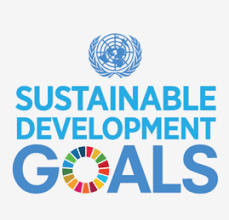 WOSM recently launched the Scouts 4 SDG’s campaign where they are encouraging Scouts around the world to step up and contribute towards the #GlobalGoals by doing one simple thing every day for a year!
WOSM recently launched the Scouts 4 SDG’s campaign where they are encouraging Scouts around the world to step up and contribute towards the #GlobalGoals by doing one simple thing every day for a year!
To assess how well our SSA programmes address the SDG’s and whether our members contribute by progressing through our programmes, we reviewed the current Cub and Rover Programmes and the new Scout programme (2019) against the SDGs.
How do SSA’s programmes contribute towards the #GlobalGoals?
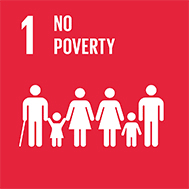 Goal 1: End poverty in all its forms everywhere
Goal 1: End poverty in all its forms everywhere
- By 2030, eradicate extreme poverty for all people everywhere, measured as people living on less than $1.90 a day
- By 2030, reduce at least by half the proportion of men, women and children of all ages living in poverty in all its dimensions according to national definitions
- Implement nationally appropriate social protection systems and measures for all, including floors, and by 2030 achieve substantial coverage of the poor and the vulnerable
- By 2030, ensure that all men and women, in particular the poor and the vulnerable, have equal rights to economic resources, as well as access to basic services, ownership and control over land and other forms of property, inheritance, natural resources, appropriate new technology and financial services, including micro-finance
- By 2030, build the resilience of the poor and those in vulnerable situations and reduce their exposure and vulnerability to climate-related extreme events and other economic, social and environmental shocks and disasters
- Ensure significant mobilization of resources from a variety of sources, including through enhanced development cooperation, in order to provide adequate and predictable means for developing countries, in particular least developed countries, to implement programmes and policies to end poverty in all its dimensions
- Create sound policy frameworks at the national, regional and international levels, based on pro-poor and gender-sensitive development strategies, to support accelerated investment in poverty eradication actions
SSA actions include:
- More than 90% of our members come from impoverished areas in South Africa.
- Life skills are taught that gives the individual the means to equip themselves to be employed and get themselves out of poverty.
- Cubs: As part of the Leaping Wolf Advancement: Find out about a global issue such as poverty, conservation or water & sanitation and what you can do to help.
- Scouts: Disaster management planning is included in the Scout Advancement programme.
- Rovers: This is covered in the Personal Bar, where essential life skills are taught for young adults, skills such as:
- Completing a CV for possible employment
- Developing a Personal Budget to learn about how to allocate financial income, and explaining the importance of saving and investing.
- Achieving a new skill, such as obtaining a driver’s license, or basic artisan skill such as (electrics, plumbing, mechanics)
- Careers Award: Allows Rovers to further their education in a form of post-school training that would provide a professional or technical qualification.
 Goal 2: End hunger, achieve food security and improved nutrition and promote sustainable agriculture
Goal 2: End hunger, achieve food security and improved nutrition and promote sustainable agriculture
- By 2030, end hunger and ensure access by all people, in particular the poor and people in vulnerable situations, including infants, to safe, nutritious and sufficient food all year round
- By 2030, end all forms of malnutrition, including achieving, by 2025, the internationally agreed targets on stunting and wasting in children under 5 years of age, and address the nutritional needs of adolescent girls, pregnant and lactating women and older persons
- By 2030, double the agricultural productivity and incomes of small-scale food producers, in particular women, indigenous peoples, family farmers, pastoralists and fishers, including through secure and equal access to land, other productive resources and inputs, knowledge, financial services, markets and opportunities for value addition and non-farm employment
- By 2030, ensure sustainable food production systems and implement resilient agricultural practices that increase productivity and production, that help maintain ecosystems, that strengthen capacity for adaptation to climate change, extreme weather, drought, flooding and other disasters and that progressively improve land and soil quality
- By 2020, maintain the genetic diversity of seeds, cultivated plants and farmed and domesticated animals and their related wild species, including through soundly managed and diversified seed and plant banks at the national, regional and international levels, and promote access to and fair and equitable sharing of benefits arising from the utilization of genetic resources and associated traditional knowledge, as internationally agreed
- Increase investment, including through enhanced international cooperation, in rural infrastructure, agricultural research and extension services, technology development and plant and livestock gene banks in order to enhance agricultural productive capacity in developing countries, in particular least developed countries
- Correct and prevent trade restrictions and distortions in world agricultural markets, including through the parallel elimination of all forms of agricultural export subsidies and all export measures with equivalent effect, in accordance with the mandate of the Doha Development Round
- Adopt measures to ensure the proper functioning of food commodity markets and their derivatives and facilitate timely access to market information, including on food reserves, in order to help limit extreme food price volatility
SSA actions include:
- Food for Life programme used in South Africa and other African countries was developed in South Africa. It enables a child to grow food at home and a nutrition chapter is included in the programme. More than 30 community food gardens have been established over the last number of years and these were mostly done at Early Childhood Development Centres (0-5 years) and primary schools (6-13 years).
- Cubs:
- Advancement: (Growing Things)
- Silver Wolf (SW): Have to grow a seed in a transparent container. When it is big enough plant it in soil.
- Gold Wolf (GW): Make and use compost from unwanted vegetation. Make or lay out a vegetable bed or herb harden or prepare a seed bed/container and plant flower seeds.
- Advancement: (Greening our Community)
- Leaping Wolf (LW): Plan and carry out a planting project at your Scout Hall or in your community.
- Interest Badges: Gardening/Food for Life Starter/World Scout Environment (make compost or a worm-farm; make notes on the progress of the compost/worm-farm over an month and explain how you expect your garden/crops to benefit from it; make a natural fertilizer and use on your crops or garden and make notes of your observation over a month.)
- Advancement: (Growing Things)
- Scouts: As part of advancement programme Scouts need to cook balanced meals at camps.
- Traveller: Lay and light a fire and cook a simple meal from raw ingredients for yourself.
- Discoverer: Cooking a balanced dinner in a backwoods style (without the use of pots or standard kitchen utensils)
- First Class: Lead your patrol in planning, cooking and serving a three course hot meal to at least six people including a guest who will be your examiner. The meal must be cooked from raw ingredients and cooked on an open fire. Demonstrate an understanding of the essential components of a balanced and healthy diet and explain how your meal meets these criteria.
- Interest Badges: Cooks Badge, Gardeners Badge, Farmer Badge, Food for Life (Starter, Silver, Gold)
- Rovers:
- Project Award: This is covered in the projects award where Rovers can establish a need in the community to address, which could be the Food for Life programme to be run for Scouts / Cubs.
- Community Service Award: This can form the main topic for development in this award.
 Goal 3: Ensure healthy lives and promote well-being for all at all ages
Goal 3: Ensure healthy lives and promote well-being for all at all ages
- By 2030, reduce the global maternal mortality ratio to less than 70 per 100,000 live births
- By 2030, end preventable deaths of newborns and children under 5 years of age, with all countries aiming to reduce neonatal mortality to at least as low as 12 per 1,000 live births and under-5 mortality to at least as low as 25 per 1,000 live births
- By 2030, end the epidemics of AIDS, tuberculosis, malaria and neglected tropical diseases and combat hepatitis, water-borne diseases and other communicable diseases
- By 2030, reduce by one third premature mortality from non-communicable diseases through prevention and treatment and promote mental health and well-being
- Strengthen the prevention and treatment of substance abuse, including narcotic drug abuse and harmful use of alcohol
- By 2020, halve the number of global deaths and injuries from road traffic accidents
- By 2030, ensure universal access to sexual and reproductive health-care services, including for family planning, information and education, and the integration of reproductive health into national strategies and programmes
- Achieve universal health coverage, including financial risk protection, access to quality essential health-care services and access to safe, effective, quality and affordable essential medicines and vaccines for all
By 2030, substantially reduce the number of deaths and illnesses from hazardous chemicals and air, water and soil pollution and contamination - Strengthen the implementation of the World Health Organization Framework Convention on Tobacco Control in all countries, as appropriate
- Support the research and development of vaccines and medicines for the communicable and noncommunicable diseases that primarily affect developing countries, provide access to affordable essential medicines and vaccines, in accordance with the Doha Declaration on the TRIPS Agreement and Public Health, which affirms the right of developing countries to use to the full the provisions in the Agreement on Trade Related Aspects of Intellectual Property Rights regarding flexibilities to protect public health, and, in particular, provide access to medicines for all
- Substantially increase health financing and the recruitment, development, training and retention of the health workforce in developing countries, especially in least developed countries and small island developing States
- Strengthen the capacity of all countries, in particular developing countries, for early warning, risk reduction and management of national and global health risks
SSA actions include:
- Cubs:
- Advancement: (Healthy Living)
- Silver Wolf: Know and understand the importance of good eating habits. Show and understand why you should keep your body, hands, nails and teeth clean.
- Gold Wolf: Find out about two infectious diseases and discuss how to prevent them from spreading with your Pack Scouter/Pack. Understand what effect smoking, alcohol and drug abuse may have on your body.
- Advancement: (Road Safety)
- Silver Wolf: Show that you know the basic rules of the road as a pedestrian.
- Gold Wolf: Identify at least ten traffic signs correctly. Demonstrate safety on the road as a cyclist or safety as a passenger in a vehicle.
- Interest Badges:
- First Aid (explain two dangers to health for each of the following: smoking, drinking alcohol.)
- World Scout Environment (name five harmful substances and their impact/affect to people and the environment, and alternate remedies to replace them)
- Cycling.
- Advancement: (Healthy Living)
- Scouts:
- HIV/Aids prevention and attitude is part of the advancement curriculum. Patrol discussions are held. An external evaluation of the programme stated that the programme does bring about positive behaviour change because of the Scout Method and the positive peer pressure within a patrol as well as the values of scouting. Part of the programme is saying “No” to things that give you a no feeling and therefore deals superficially with drugs. It does address the gender issues.
- All Scouts follow the First Aid curriculum.
- Discoverer: Complete the First Aid Scoutcraft badge.
- First Class: Complete the First Aid Interest badge.
- Other Interest badges: Public Health, Disaster Management, Safety Code.
- Example of Public Health requirement: Visit a local community health centre, discuss with its Staff which issues are most affecting family life in your community, and report back to your Troop in the form a discussion aimed at developing an understanding of these issues among younger Scouts.
- Traveller: While on camp, maintain personal hygiene and explain the need for it.
- Springbok: Take your Patrol on a day outing to visit one of the emergency services or invite a guest speaker from one of the emergency services to talk to your Patrol/Troop.
- Rovers:
- Public Health Award: Demonstrate a knowledge of the causes, prevention, symptoms and treatment of HIV/AIDS and one other disease chosen from: Cancer; Tuberculosis; Diabetes; Malaria; Cholera. From the two options selected above, run an awareness campaign in your community, e.g. Schools, community centres, shopping centres. This campaign should be agreed upon in consultation with the RS or Crew Council. Volunteer for 40 hours at a hospital/clinic/treatment centre where patients for one or more of these conditions are treated/cared for. This should be completed over a four month period.
 Goal 4: Ensure inclusive and quality education for all and promote lifelong learning
Goal 4: Ensure inclusive and quality education for all and promote lifelong learning
- By 2030, ensure that all girls and boys complete free, equitable and quality primary and secondary education leading to relevant and Goal-4 effective learning outcomes
- By 2030, ensure that all girls and boys have access to quality early childhood development, care and pre-primary education so that they are ready for primary education
- By 2030, ensure equal access for all women and men to affordable and quality technical, vocational and tertiary education, including university
- By 2030, substantially increase the number of youth and adults who have relevant skills, including technical and vocational skills, for employment, decent jobs and entrepreneurship
- By 2030, eliminate gender disparities in education and ensure equal access to all levels of education and vocational training for the vulnerable, including persons with disabilities, indigenous peoples and children in vulnerable situations
- By 2030, ensure that all youth and a substantial proportion of adults, both men and women, achieve literacy and numeracy
- By 2030, ensure that all learners acquire the knowledge and skills needed to promote sustainable development, including, among others, through education for sustainable development and sustainable lifestyles, human rights, gender equality, promotion of a culture of peace and non-violence, global citizenship and appreciation of cultural diversity and of culture’s contribution to sustainable development
- Build and upgrade education facilities that are child, disability and gender sensitive and provide safe, nonviolent, inclusive and effective learning environments for all
- By 2020, substantially expand globally the number of scholarships available to developing countries, in particular least developed countries, small island developing States and African countries, for enrolment in higher education, including vocational training and information and communications technology, technical, engineering and scientific programmes, in developed countries and other developing countries
- By 2030, substantially increase the supply of qualified teachers, including through international cooperation for teacher training in developing countries, especially least developed countries and small island developing states
SSA actions include:
- Cubs: A number of the Cub activities, e.g. compass and mapping, enhance what the Cubs are learning at school.
- Interest badges: Scholar – reading of books are encouraged; Linguist – a second language is encouraged
- Scouts: Scouting compliments the school curriculum and in many cases they do topics before it is done at school, i.e. building a water filter is done at Cub age, but only done at schools at Scout age.
Programme addresses human rights, gender equality, promotion of a culture of peace and non-violence, citizenship and appreciation of cultural diversity.- Springbok Level: Demonstrate your respect for others by doing one aspect listed below:
a. interview / go to a meal with someone who practices a different religion to you after getting approval from your Troop Scouter. Report on what you learnt to your Patrol or Troop. OR
b. Lead your Troop in a discussion / debate on a relevant local social issue such as differences in religion, gender or ethnicity. The topic should be agreed upon by the Troop Scouter. OR
c. Construct a handicap awareness trail for younger Scouts to use. OR
d. Take younger Scouts on a visit to an organisation that works with disabled people.
- Springbok Level: Demonstrate your respect for others by doing one aspect listed below:
- Rovers: The first phase of Rover training is designed for the betterment of the Rover. It focuses on the personal development of the Rover (age bracket 18-23).
- Personal Bar: Discuss with your Rover Scouter (or person of confidence) your personal plan for the future: studies, apprenticeship, work and any peer pressures. Define personal goals that are achievable in defined time periods. Over a 6 month period, review these personal goals with your Rover Scouter (or person of confidence).
- Careers Award: Allows Rovers to further their education in a form of post-school training that would provide a professional or technical qualification.
- Scoutcraft Award: Trains on skills such as Firefighting, Public Health, Air Navigator, Astronomer, Cook, Mapping that all could be furthered into a professional career.
 Goal 5: Achieve gender equality and empower all women and girls
Goal 5: Achieve gender equality and empower all women and girls
- End all forms of discrimination against all women and girls everywhere
- Eliminate all forms of violence against all women and girls in the public and private spheres, including trafficking and sexual and other types of exploitation
- Eliminate all harmful practices, such as child, early and forced marriage and female genital mutilation
- Recognize and value unpaid care and domestic work through the provision of public services, infrastructure and social protection policies and the promotion of shared responsibility within the household and the family as nationally appropriate
- Ensure women’s full and effective participation and equal opportunities for leadership at all levels of decision-making in political, economic and public life
- Ensure universal access to sexual and reproductive health and reproductive rights as agreed in accordance with the Programme of Action of the International Conference on Population and Development and the Beijing Platform for Action and the outcome documents of their review conferences
- Undertake reforms to give women equal rights to economic resources, as well as access to ownership and control over land and other forms of property, financial services, inheritance and natural resources, in accordance with national laws
- Enhance the use of enabling technology, in particular information and communications technology, to promote the empowerment of women
- Adopt and strengthen sound policies and enforceable legislation for the promotion of gender equality and the empowerment of all women and girls at all levels
SSA actions include:
- SCOUTS South Africa opened for girls in 2000. The programme is exactly the same for girls and boys and they wear the same uniform shirt too.
- A SSA parent has offered to conduct research comparing Groups to see if there are any gender disparities or language inequality in the programme.
- Cubs: Girls fully take part in the programme and have the same opportunities for leadership (Sixes and Seconds).
- Scouts: Depending on the Troop, there would be boy Patrols, girl Patrols and mixed Patrols. The girls do exactly the same obstacle courses as the boys in the leadership training camps.
- Rovers: In Rover Crews, members are all equal and can take on all roles within the Crew such as Crew Chairperson. The leadership style of Rovers focus on peer-learning as all members learn from each other as they develop through the programme.
 Goal 6: Ensure access to water and sanitation for all
Goal 6: Ensure access to water and sanitation for all
- By 2030, achieve universal and equitable access to safe and affordable drinking water for all
- By 2030, achieve access to adequate and equitable sanitation and hygiene for all and end open defecation, paying special attention to the needs of women and girls and those in vulnerable situations
- By 2030, improve water quality by reducing pollution, eliminating dumping and minimizing release of hazardous chemicals and materials, halving the proportion of untreated wastewater and substantially increasing recycling and safe reuse globally
- By 2030, substantially increase water-use efficiency across all sectors and ensure sustainable withdrawals and supply of freshwater to address water scarcity and substantially reduce the number of people suffering from water scarcity
- By 2030, implement integrated water resources management at all levels, including through trans-boundary cooperation as appropriate
- By 2020, protect and restore water-related ecosystems, including mountains, forests, wetlands, rivers, aquifers and lakes
- By 2030, expand international cooperation and capacity-building support to developing countries in water- and sanitation-related activities and programmes, including water harvesting, desalination, water efficiency, wastewater treatment, recycling and reuse technologies
- Support and strengthen the participation of local communities in improving water and sanitation management
SSA actions include:
- The programme in South Africa has a strong emphasis on environmental education. Over the last 4 years more than 8,000 Scouts attended environmental education camps with a focus on water and sanitation. In the last 15 years more than 20,000 Scouts and school children have attended these camps.
Water Champ badge was launched in 2018 focusing on saving water and preparing for possible day where there will be no water in taps. This has been a reality in South Africa the last few years. - Cubs:
- Advancement: (Healthy Living)
- Silver Wolf: Explain the importance of washing your hands before handling food, before eating, and after using the washroom.
- Golf Wolf: Understand the importance of always drinking clean drinking water. Demonstrate how to make water safe for drinking, if no clean water is available.
- Advancement: (Our Precious Planet)
- Silver Wolf: Demonstrate how clean or dirty the water is that you use.
- Advancement: (Leaping Wolf): Find out about a global issue such as poverty, conservation or water and sanitation and what you can do to help.
- Interest Badges:
- Outdoors man (demonstrate how to collect water with either trap, condensation or still)
- World Scout Environment (find out about three water borne diseases and how to prevent them.)
- Water Champion
- Conservation (implement a water saving technique at home and show the technique or the water savings achieved.)
- Advancement: (Healthy Living)
- Scouts:
- Personal hygiene is incorporated in the advancement programme. This is enforced from the start of them joining Scouts.
- Traveller: i. Use a kit list to check and pack your personal kit.
ii. While on a camp, maintain personal hygiene and explain the need for it.
- Rovers:
- Public Health Award: Diseases such as Cholera and water sanitation are suggested as topics for a service project.
- Community Service: Define a project to be carried out.
- Civics Award: Research the topic, and provide a talk to local communities and complete a 6 month project on the topic.
- Emergency Readiness: Assist in disaster management team.
- Community Bar: Establish a need in the community to address on the issues and provide a reasonable project to be carried out (e.g.: Water in CT).
 Goal 7: Ensure access to affordable, reliable, sustainable and modern energy for all
Goal 7: Ensure access to affordable, reliable, sustainable and modern energy for all
- By 2030, ensure universal access to affordable, reliable and modern energy services
- By 2030, increase substantially the share of renewable energy in the global energy mix
- By 2030, double the global rate of improvement in energy efficiency
- By 2030, enhance international cooperation to facilitate access to clean energy research and technology, including renewable energy, energy efficiency and advanced and cleaner fossil-fuel technology, and promote investment in energy infrastructure and clean energy technology
- By 2030, expand infrastructure and upgrade technology for supplying modern and sustainable energy services for all in developing countries, in particular least developed countries, small island developing States, and land-locked developing countries, in accordance with their respective programmes of support
SSA actions include:
- Conservation stove cooking and solar cooking is encouraged in the Cub and Scout programme and as part of their camps.
- Scouts:
- First Class: Be able to explain to younger Scouts the importance of conserving wood resources by building and demonstrating the successful use of two of the following: Hay box or wonder box, Reflector oven, Solar box, Conservation wood stove, Camp fridge, Solar water heater for showers, Solar water sterilizer, Similar device.
 Goal 8: Promote inclusive and sustainable economic growth, employment and decent work for all
Goal 8: Promote inclusive and sustainable economic growth, employment and decent work for all
- Sustain per capita economic growth in accordance with national circumstances and, in particular, at least 7 per cent gross domestic product growth per annum in the least developed countries
- Achieve higher levels of economic productivity through diversification, technological upgrading and innovation, including through a focus on high-value added and labour-intensive sectors
- Promote development-oriented policies that support productive activities, decent job creation, entrepreneurship, creativity and innovation, and encourage the formalization and growth of micro-, small- and medium-sized enterprises, including through access to financial services
- Improve progressively, through 2030, global resource efficiency in consumption and production and endeavour to decouple economic growth from environmental degradation, in accordance with the 10-year framework of programmes on sustainable consumption and production, with developed countries taking the lead
- By 2030, achieve full and productive employment and decent work for all women and men, including for young people and persons with disabilities, and equal pay for work of equal value
- By 2020, substantially reduce the proportion of youth not in employment, education or training
- Take immediate and effective measures to eradicate forced labour, end modern slavery and human trafficking and secure the prohibition and elimination of the worst forms of child labour, including recruitment and use of child soldiers, and by 2025 end child labour in all its forms
- Protect labour rights and promote safe and secure working environments for all workers, including migrant workers, in particular women migrants, and those in precarious employment
- By 2030, devise and implement policies to promote sustainable tourism that creates jobs and promotes local culture and products
- Strengthen the capacity of domestic financial institutions to encourage and expand access to banking, insurance and financial services for all
- Increase Aid for Trade support for developing countries, in particular least developed countries, including through the Enhanced Integrated Framework for Trade-Related Technical Assistance to Least Developed Countries
- By 2020, develop and operationalize a global strategy for youth employment and implement the Global Jobs Pact of the International Labour Organization
SSA actions include:
- SCOUTS South Africa tries its utmost to ensure that no items are sold in the Scout shops that were manufactured in facilities where child labour was used. South Africa’s legislation is very strict with regards to child labour, thus most of our products are produced in South Africa and where possible factories visited. This is also in line with the agreement between WOSM and SSA.
- Cubs: Will be introducing different vocations to the Cubs through programmes-on-plate.
- Scouts: Child rights and responsibilities are part of the programme.
- Vocational interest badges are available to Scouts and the following badges are part of the advancement programme and Scouts can choose to do some of them: Handyman, Watermanship, Airmanship, Boatman, Helmsman, Air Traffic Controller, Cook
- Springbok , one of the options in the badge requirements: complete a formal wildlife training programme/certificate where you will learn skills that would be recognised, e.g. game ranging, ornithology. Lead a party of at least four people on an excursion where you can demonstrate these skills.
- Rovers:
- Personal Bar: achieve one of the following: gain a driver’s license, demonstrate computer literacy, run a Food for Life campaign, or learn basic artisans skills (such as: electrics, plumbing, carpentry, car maintenance).
- Learn the importance of a budget and how to save/ invest your financial income.
- Careers Award: allows Rovers to further their education in a form of post-school training that would provide a professional or technical qualification.
 Goal 9: Build resilient infrastructure, promote sustainable industrialization and foster innovation
Goal 9: Build resilient infrastructure, promote sustainable industrialization and foster innovation
- Develop quality, reliable, sustainable and resilient infrastructure, including regional and trans-border infrastructure, to support economic development and human well-being, with a focus on affordable and equitable access for all
- Promote inclusive and sustainable industrialization and, by 2030, significantly raise industry’s share of employment and gross domestic product, in line with national circumstances, and double its share in least developed countries
- Increase the access of small-scale industrial and other enterprises, in particular in developing countries, to financial services, including affordable credit, and their integration into value chains and markets
- By 2030, upgrade infrastructure and retrofit industries to make them sustainable, with increased resource-use efficiency and greater adoption of clean and environmentally sound technologies and industrial processes, with all countries taking action in accordance with their respective capabilities
- Enhance scientific research, upgrade the technological capabilities of industrial sectors in all countries, in particular developing countries, including, by 2030, encouraging innovation and substantially increasing the number of research and development workers per 1 million people and public and private research and development spending
- Facilitate sustainable and resilient infrastructure development in developing countries through enhanced financial, technological and technical support to African countries, least developed countries, landlocked developing countries and small island developing States
- Support domestic technology development, research and innovation in developing countries, including by ensuring a conducive policy environment for, inter alia, industrial diversification and value addition to commodities
- Significantly increase access to information and communications technology and strive to provide universal and affordable access to the Internet in least developed countries by 2020
SSA actions include:
- Cubs:
- Advancement: (Personal Safety)
GW: Know and understand the following terms: cyberbullying; surfing the net; identity theft; social network. Discuss the importance of never giving out personal information to someone you have never met. Discuss the implications of posting/texting negative content. - Advancement: (Technology in Action)
LW: Find out about a technology of your choice. Understand its basic functions, how it is used and a brief history. Present your findings to the rest of the Pack. - Interest Badges: Computer, Projects, Simple Machines
- Advancement: (Personal Safety)
- Scouts: Example for First Class:
- i) Research one of the following scenarios and, after discussion with your Scouter, prepare an imaginative training exercise designed to provide your Patrol members with practical advice on how to survive a scenario with the least risk of harm from the list. Run the exercise and discuss the results with your Scouter:
a. A hijacking;
b. A home intrusion;
c. An armed robbery;
d. A gang battle;
e. Any other similar topic approved by your Scouter. - ii Lead a discussion in your Patrol on abuse and bullying at school or on the internet including how to protect younger Scouts or friends from abuse.
- i) Research one of the following scenarios and, after discussion with your Scouter, prepare an imaginative training exercise designed to provide your Patrol members with practical advice on how to survive a scenario with the least risk of harm from the list. Run the exercise and discuss the results with your Scouter:
- Rovers:
- Movement Bar: Develop/create a poster/newspaper article/webpage or similar publicity to generate awareness for the Movement, whether it is for Cubs, Scouts or Rovers. This should be agreed upon by your RS or Crew Council.
- Community Bar: Make contact with another Rover from a different Region or Country. Discuss social issues that are affecting you both. Present your findings to the Crew.
 Goal 10: Reduce inequality within and among countries
Goal 10: Reduce inequality within and among countries
- By 2030, progressively achieve and sustain income growth of the bottom 40 per cent of the population at a rate higher than the national average
- By 2030, empower and promote the social, economic and political inclusion of all, irrespective of age, sex, disability, race, ethnicity, origin, religion or economic or other status
- Ensure equal opportunity and reduce inequalities of outcome, including by eliminating discriminatory laws, policies and practices and promoting appropriate legislation, policies and action in this regard
- Adopt policies, especially fiscal, wage and social protection policies, and progressively achieve greater equality
- Improve the regulation and monitoring of global financial markets and institutions and strengthen the implementation of such regulations
- Ensure enhanced representation and voice for developing countries in decision-making in global international economic and financial institutions in order to deliver more effective, credible, accountable and legitimate institutions
- Facilitate orderly, safe, regular and responsible migration and mobility of people, including through the implementation of planned and well-managed migration policies
- Implement the principle of special and differential treatment for developing countries, in particular least developed countries, in accordance with World Trade Organization agreements
- Encourage official development assistance and financial flows, including foreign direct investment, to States where the need is greatest, in particular least developed countries, African countries, small island developing States and landlocked developing countries, in accordance with their national plans and programmes
- By 2030, reduce to less than 3 per cent the transaction costs of migrant remittances and eliminate remittance corridors with costs higher than 5 per cent.
SSA actions include:
- SCOUTS South Africa’s constitution is clear that we are open to all. “SCOUTS South Africa is governed by this Constitution as an independent, non-political, non-Governmental, non-profit and educational movement for boys, girls and adults open to all without distinction of origin, race, creed, sexual orientation or gender identity in accordance with the purpose, principles and method of the World Organisation of the Scout Movement conceived by the Founder Robert Baden-Powell and stated below.”
We have tried to cater for everyone’s needs, rural and urban members. One aspect which needs attention is working with special needs. Ideas on how to adapt the programme for children who cannot run, jump, tie knots, etc. - Scouts: Springbok, set up a handicapped awareness trail for younger Scouts to use and explain why it is significant.
- Rovers:
- Personal Bar (4)
Attend religious ceremonies of your faith. Research some aspect of your faith. Explain how it relates to the Promise and Law. - Community Bar (4)
Make contact with another Rover from a different Region or Country. Discuss social issues that are affecting you both. Present your findings to the Crew.
- Personal Bar (4)
 Goal 11: Make cities and human settlements inclusive, safe, resilient and sustainable
Goal 11: Make cities and human settlements inclusive, safe, resilient and sustainable
- By 2030, ensure access for all to adequate, safe and affordable housing and basic services and upgrade slums
- By 2030, provide access to safe, affordable, accessible and sustainable transport systems for all, improving road safety, notably by expanding public transport, with special attention to the needs of those in vulnerable situations, women, children, persons with disabilities and older persons
- By 2030, enhance inclusive and sustainable urbanization and capacity for participatory, integrated and sustainable human settlement planning and management in all countries
- Strengthen efforts to protect and safeguard the world’s cultural and natural heritage
- By 2030, significantly reduce the number of deaths and the number of people affected and substantially decrease the direct economic losses relative to global gross domestic product caused by disasters, including water-related disasters, with a focus on protecting the poor and people in vulnerable situations
- By 2030, reduce the adverse per capita environmental impact of cities, including by paying special attention to air quality and municipal and other waste management
- By 2030, provide universal access to safe, inclusive and accessible, green and public spaces, in particular for women and children, older persons and persons with disabilities
- Support positive economic, social and environmental links between urban, peri-urban and rural areas by strengthening national and regional development planning
- By 2020, substantially increase the number of cities and human settlements adopting and implementing integrated policies and plans towards inclusion, resource efficiency, mitigation and adaptation to climate change, resilience to disasters, and develop and implement, in line with the Sendai Framework for Disaster Risk Reduction 2015-2030, holistic disaster risk management at all levels
- Support least developed countries, including through financial and technical assistance, in building sustainable and resilient buildings utilizing local materials
SSA actions include:
- Cubs:
- Advancement: (Communication)
- Silver Wolf: Take part in a cultural activity with your Pack. Learn to say hello, goodbye and thank-you in another language and teach them to your Leader/Pack.
- Gold Wolf: List different cultural groups, other than your own, living in your community. Choose one and share something interesting about your chosen culture with your Six/Pack.
- Interest Badges:
- Conservation (visit a fauna or flora reserve and report how these reserves conserve animals and plants.)
- Naturalist (visit a museum of natural history or zoo and find out the purpose of the place visited and the things collected.)
- Indigenous Games
- Citizen
- Scouts:
- Example for First Class: plan and lead a friendship activity with a Patrol from another Troop.
- Interest Badges: World Scout Environment badge, Food for Life, World Friendship
- Rovers:
- Civic Award:
Show by means of a talk, or by taking part in a discussion before an audience consisting of the members of your Crew, that you have made a close study of some social or civic question of current interest. - Emergency Service Award:
The intention of this award is to demonstrate your ability to be of service to the community in times of disaster. You may complete the requirements in any recognised emergency service discipline e.g. firefighting, first aid, water rescue, mountain rescue, hazardous material handling, security, disaster communications or disaster management.
- Civic Award:
 Goal 12: Ensure sustainable consumption and production pattern
Goal 12: Ensure sustainable consumption and production pattern
- Implement the 10-year framework of programmes on sustainable consumption and production, all countries taking action, with developed countries taking the lead, taking into account the development and capabilities of developing countries
- By 2030, achieve the sustainable management and efficient use of natural resources
- By 2030, halve per capita global food waste at the retail and consumer levels and reduce food losses along production and supply chains, including post-harvest losses
- By 2020, achieve the environmentally sound management of chemicals and all wastes throughout their life cycle, in accordance with agreed international frameworks, and significantly reduce their release to air, water and soil in order to minimize their adverse impacts on human health and the environment
- By 2030, substantially reduce waste generation through prevention, reduction, recycling and reuse
- Encourage companies, especially large and transnational companies, to adopt sustainable practices and to integrate sustainability information into their reporting cycle
- Promote public procurement practices that are sustainable, in accordance with national policies and priorities
- By 2030, ensure that people everywhere have the relevant information and awareness for sustainable development and lifestyles in harmony with nature
- Support developing countries to strengthen their scientific and technological capacity to move towards more sustainable patterns of consumption and production
- Develop and implement tools to monitor sustainable development impacts for sustainable tourism that creates jobs and promotes local culture and products
- Rationalize inefficient fossil-fuel subsidies that encourage wasteful consumption by removing market distortions, in accordance with national circumstances, including by restructuring taxation and phasing out those harmful subsidies, where they exist, to reflect their environmental impacts, taking fully into account the specific needs and conditions of developing countries and minimizing the possible adverse impacts on their development in a manner that protects the poor and the affected communities.
SSA actions include:
- As part of the environmental education camps pollution is looked at as well as how to reduce pollution in terms of its effects on climate change. SCOUTS South Africa was, after Canada, the 2nd NSO to introduce a climate change programme.
- Reduction of plastic is the current theme globally. In South Africa it is also practiced in the programmes. The Cubs (in partnership with the Two Oceans Aquarium) are running an annual campaign in 2018 on reducing the use of plastic. In 2017 a Cub of 10 years old convinced a shopping and entertainment centre in Johannesburg to stop using straws at all restaurants.
- Cubs:
- Advancement: (Home Safety)
Gold Wolf: Find out how to treat the effect of poisons that can be found at home. Have covered this under one or two of the other headings – conservation/recycling, etc. - Cub Challenge on the use of plastic.
- Advancement: (Home Safety)
- Scouts: The Safety Awareness theme badge in the Scout advancement programme cover extensively the personal safety issue.
- Example 1 (Traveller):
- 1. Discuss in your Patrol OR with another Scout stage a role-play that emphasises the importance and principle of the buddy system.
- 2. At a simulation staged by your Scouter or PL, know how to approach an emergency scene safely, including the 3 H’s (Hazard, Hello, Help) and the importance of your own safety over the safety of the victim. As part of this requirement memorise the main contact numbers for the various emergency services in your area and know how to report an emergency to these services correctly.
- 3. Discuss various methods of how to draw attention to yourself in an emergency situation where you do not have access to a telephone.
- 4. Show a basic knowledge of ground-to-air signals.
- 5. Understand the dangers of fires and how they spread. Describe that you know how to use a fire extinguisher of any sort, and under the correct conditions. Demonstrate how to extinguish a camp or camp kitchen fire correctly using a sand or water fire bucket.
- 6. Explain and demonstrate the components of the Reach, throw, row and go concept of assisting a swimmer in difficulty.
- Example 2 (Discoverer):
- i. Devise a safety checklist for your house or other building.
- ii. After approval by your Scouter, use that checklist to make an inspection of the building. Hazards that could be checked include: oil lamps; pressure stoves; Flannelette, silk, nylon, Christmas decorations; Plastics; Inflammable liquids; electrical outlets or appliances; Liquefied Petroleum Gas (LPG), etc.
- iii. Explain the hazards found, why they are hazards and how they can be corrected. Within the constraints of your ability and finances correct these hazards you have identified.
- Example 3 (First class):
- i) Research one of the following scenarios and, after discussion with your Scouter, prepare an imaginative training exercise designed to provide your Patrol members with practical advice on how to survive a scenario with the least risk of harm from the list. Run the exercise and discuss the results with your Scouter:
a. A hijacking;
b. A home intrusion;
c. An armed robbery;
d. A gang battle;
e. Any other similar topic approved by your Scouter. - ii Lead a discussion in your Patrol on abuse and bullying at school or on the internet including how to protect younger Scouts or friends from abuse.
“Learn some basic self preservation techniques/ strategies and train your Patrol in these self-preservation strategies/ techniques.
- i) Research one of the following scenarios and, after discussion with your Scouter, prepare an imaginative training exercise designed to provide your Patrol members with practical advice on how to survive a scenario with the least risk of harm from the list. Run the exercise and discuss the results with your Scouter:
- Interest Badges: Disaster Management, Life Saver, Home Carer, Fire Fighter, Safety Code & Public Health.
- Example 1 (Traveller):
- Rovers:
- Civic Award:
Show by means of a talk, or by taking part in a discussion before an audience consisting of the members of your Crew, that you have made a close study of some social or civic question of current interest. - Community Service Award:
Participate in a local community project of your own choice for a period of six months (or longer if desired).
- Civic Award:
 Goal 13: Take urgent action to combat climate change and its impacts
Goal 13: Take urgent action to combat climate change and its impacts
- Strengthen resilience and adaptive capacity to climate-related hazards and natural disasters in all countries
- Integrate climate change measures into national policies, strategies and planning
- Improve education, awareness-raising and human and institutional capacity on climate change mitigation, adaptation, impact reduction and early warning
- Implement the commitment undertaken by developed-country parties to the United Nations Framework Convention on Climate Change to a goal of mobilizing jointly $100 billion annually by 2020 from all sources to address the needs of developing countries in the context of meaningful mitigation actions and transparency on implementation and fully operationalize the Green Climate Fund through its capitalization as soon as possible
- Promote mechanisms for raising capacity for effective climate change-related planning and management in least developed countries and small island developing States, including focusing on women, youth and local and marginalized communities.
SSA actions include:
- As mentioned before the climate change programme and the environmental education camps speak to it. Over the last 5 years the ee camps curriculum was brought in line with the World Scout Environment Badge.
- Cubs:
- Advancement: (Conservation)
Gold Wolf: Identify everyday activities in your home which waste or consume energy. Heat water using solar energy or use solar energy to cook something. - Advancement: (Campcraft)
- Silver Wolf: Using an alternate fuel source, show how it can be used to heat up soup (or similar).
- Gold Wolf: Use a conservation stove and cook a simple meal for yourself.
- Interest Badges: Recycling, World Scout Environment Badge
- Advancement: (Conservation)
- Scouts:
- Example (Springbok): Be able to explain to younger Scouts the importance of conserving wood resources by building and demonstrating the successful use of two of the following: hay box or wonder box, reflector oven, solar box, conservation wood stove, camp fridge, solar water heater for showers, solar water sterilizer, similar device (approved by your TS).
- Interest Badge: World Scout Environment Badge
- Rovers:
- Civic Award:
Show by means of a talk, or by taking part in a discussion before an audience consisting of the members of your Crew, that you have made a close study of some social or civic question of current interest.
- Civic Award:
 Goal 14: Conserve and sustainably use the oceans, seas and marine resources
Goal 14: Conserve and sustainably use the oceans, seas and marine resources
- By 2025, prevent and significantly reduce marine pollution of all kinds, in particular from land-based activities, including marine debris and nutrient pollution
- By 2020, sustainably manage and protect marine and coastal ecosystems to avoid significant adverse impacts, including by strengthening their resilience, and take action for their restoration in order to achieve healthy and productive oceans
- Minimize and address the impacts of ocean acidification, including through enhanced scientific cooperation at all levels
- By 2020, effectively regulate harvesting and end overfishing, illegal, unreported and unregulated fishing and destructive fishing practices and implement science-based management plans, in order to restore fish stocks in the shortest time feasible, at least to levels that can produce maximum sustainable yield as determined by their biological characteristics
- By 2020, conserve at least 10 per cent of coastal and marine areas, consistent with national and international law and based on the best available scientific information
- By 2020, prohibit certain forms of fisheries subsidies which contribute to overcapacity and overfishing, eliminate subsidies that contribute to illegal, unreported and unregulated fishing and refrain from introducing new such subsidies, recognizing that appropriate and effective special and differential treatment for developing and least developed countries should be an integral part of the World Trade Organization fisheries subsidies negotiation
- By 2030, increase the economic benefits to Small Island developing States and least developed countries from the sustainable use of marine resources, including through sustainable management of fisheries, aquaculture and tourism
- Increase scientific knowledge, develop research capacity and transfer marine technology, taking into account the Intergovernmental Oceanographic Commission Criteria and Guidelines on the Transfer of Marine Technology, in order to improve ocean health and to enhance the contribution of marine biodiversity to the development of developing countries, in particular small island developing States and least developed countries
- Provide access for small-scale artisanal fishers to marine resources and markets
- Enhance the conservation and sustainable use of oceans and their resources by implementing international law as reflected in UNCLOS, which provides the legal framework for the conservation and sustainable use of oceans and their resources, as recalled in paragraph 158 of The Future We Want.
SSA actions include:
- Cubs:
- Advancement: (Our Precious Planet)
Silver Wolf: Find out three things that cause water pollution and show how you could possibly undo pollution in water. Make a water scope to observe life underwater. - 2018 National Challenge: Reducing plastics
- Interest Badges: MiniSASS, Recycling
- Advancement: (Our Precious Planet)
- Scouts:
- Example 1 (Traveller): Explain the reason for the Outdoor code
- Example 2 (Discoverer): Identify an outdoor environmental service project to improve the quality of the environment in your community. The total project should take six hours. Complete this service by you self or lead your patrol in meeting this need.
- Interest Badges: World Scout Environment, Water Biologist
- Rovers:
- Civic Award:
Show by means of a talk, or by taking part in a discussion before an audience consisting of the members of your Crew, that you have made a close study of some social or civic question of current interest. - Community Service Award:
Participate in a local community project of your own choice for a period of six months (or longer if desired).
 Goal 15: Sustainably manage forests, combat desertification, halt and reverse land degradation, halt biodiversity loss
Goal 15: Sustainably manage forests, combat desertification, halt and reverse land degradation, halt biodiversity loss
- By 2020, ensure the conservation, restoration and sustainable use of terrestrial and inland freshwater ecosystems and their services, in particular forests, wetlands, mountains and drylands, in line with obligations under international agreements
- By 2020, promote the implementation of sustainable management of all types of forests, halt deforestation, restore degraded forests and substantially increase afforestation and reforestation globally
- By 2030, combat desertification, restore degraded land and soil, including land affected by desertification, drought and floods, and strive to achieve a land degradation-neutral world
- By 2030, ensure the conservation of mountain ecosystems, including their biodiversity, in order to enhance their capacity to provide benefits that are essential for sustainable development
- Take urgent and significant action to reduce the degradation of natural habitats, halt the loss of biodiversity and, by 2020, protect and prevent the extinction of threatened species
- Promote fair and equitable sharing of the benefits arising from the utilization of genetic resources and promote appropriate access to such resources, as internationally agreed
- Take urgent action to end poaching and trafficking of protected species of flora and fauna and address both demand and supply of illegal wildlife products
- By 2020, introduce measures to prevent the introduction and significantly reduce the impact of invasive alien species on land and water ecosystems and control or eradicate the priority species
- By 2020, integrate ecosystem and biodiversity values into national and local planning, development processes, poverty reduction strategies and accounts
- Mobilize and significantly increase financial resources from all sources to conserve and sustainably use biodiversity and ecosystems
- Mobilize significant resources from all sources and at all levels to finance sustainable forest management and provide adequate incentives to developing countries to advance such management, including for conservation and reforestation
- Enhance global support for efforts to combat poaching and trafficking of protected species, including by increasing the capacity of local communities to pursue sustainable livelihood opportunities
SSA actions include:
- Alien vegetation is removed from Scout camp sites and replanting of trees are done. As part of Food for Life the programme encourages the planting of fruit trees. The ee camps plant trees.
- Cubs:
- Advancement: (Conservation)
Silver Wolf: Explain to a Pack Scouter what conservation means. Name three natural resources which are important to conserve. Show a Pack Scouter how you can help to conserve them. - Advancement: (Our Precious Planet)
Gold Wolf: Acid rain is a worldwide problem affecting our planet. Find out about acid rain and demonstrate how it affects our planet. Find out how plants help to fight air pollution and run an experiment to show this. - Advancement: (Living with Nature)
Gold Wolf: Describe the uses of trees. Take care of a tree for one month. Find out about two endangered species in South Africa and tell the Pack about them. - Interest Badges: Conservation, Naturalist, World Scout Environment Badge
- Advancement: (Conservation)
- Scouts:
Requirement: Environmental Awareness: a) Explore a local natural area and keep a record of plants and animals observed at different times of one day over 5 x 20- minute visits between sunrise and sunset. b) Interpret what is happening in this area and how Scouts could care for it, and write up or explain your conclusions. - Rovers:
- Civic Award:
Show by means of a talk, or by taking part in a discussion before an audience consisting of the members of your Crew, that you have made a close study of some social or civic question of current interest. - Community Service Award:
Participate in a local community project of your own choice for a period of six months (or longer if desired). - Scout Craft Award:
Demonstrate that you are competent to instruct or examine in any two of the following Scout Interest Badges: Air Navigator, Backwoodsman, Campfire Leader, Astronomer, Woodcraftsman, Cook, Veldcraft, Firefighter, Pioneer, Mapping and Public Health.
- Civic Award:
 Goal 16: Promote just, peaceful and inclusive societies
Goal 16: Promote just, peaceful and inclusive societies
- Significantly reduce all forms of violence and related death rates everywhere
- End abuse, exploitation, trafficking and all forms of violence against and torture of children
- Promote the rule of law at the national and international levels and ensure equal access to justice for all
- By 2030, significantly reduce illicit financial and arms flows, strengthen the recovery and return of stolen assets and combat all forms of organized crime
- Substantially reduce corruption and bribery in all their forms
- Develop effective, accountable and transparent institutions at all levels
- Ensure responsive, inclusive, participatory and representative decision-making at all levels
- Broaden and strengthen the participation of developing countries in the institutions of global governance
- By 2030, provide legal identity for all, including birth registration
- Ensure public access to information and protect fundamental freedoms, in accordance with national legislation and international agreements
- Strengthen relevant national institutions, including through international cooperation, for building capacity at all levels, in particular in developing countries, to prevent violence and combat terrorism and crime
- Promote and enforce non-discriminatory laws and policies for sustainable development
SSA actions include:
- Children rights and responsibilities are included in the programmes
- Child abuse help lines promoted
- Child Protection Policy in place
- Cubs:
Citizen interest badge: why we have a government. Describe three things the government or the municipality does for you and your family. - Scouts:
The Leadership model is based on decision-making at all levels. From the Troop with the Court of Honour through all the structures.
Good citizenship is included in the programme and community service is built in on all levels in the advancement programme, with 40 hours of community service as part of the Top award.
Requirement example: Attend a local community meeting, observe the proceedings and report back to your Troop or Court of Honour on your observations and interpretation of the democratic process in practice. - Rovers:
- The leadership model for Rovering defines the skills sets in the first phase (Personal Bar), thereby taking these skills and using them in the movement (Movement Bar), finally they are equipped to use the skills in the community (Community Bar), thereby moving to the final level of becoming a better citizen (Leadership Bar).
Requirement: Attend at least four meetings of local community associations or the like (e.g. community policing forums, community residents’ association, etc). From these meetings identify issues that are affecting your community. With the approval of the RS or Crew Council, research at least three of these issues, including causes, effects and possible solutions, and present your findings to your Crew. These issues could include but are not limited to water, electricity, sewage, waste, parks and recreation, transport, health, housing, security, local economic development and roads.
From the above, lead a discussion group with your Crew on the three chosen issues affecting your community. This discussion must include a balanced presentation of arguments from all angles. From this discussion, identify and agree on a Crew project to address one of the three issues – agree on the scope and nature of the project, as well as the goals to be achieved by the project. - Civic Award:
Show by means of a talk, or by taking part in a discussion before an audience consisting of the members of your Crew, that you have made a close study of some social or civic question of current interest. - Emergency Service Award:
The intention of this award is to demonstrate your ability to be of service to the community in times of disaster. You may complete the requirements in any recognised emergency service discipline e.g. firefighting, first aid, water rescue, mountain rescue, hazardous material handling, security, disaster communications or disaster management.
- The leadership model for Rovering defines the skills sets in the first phase (Personal Bar), thereby taking these skills and using them in the movement (Movement Bar), finally they are equipped to use the skills in the community (Community Bar), thereby moving to the final level of becoming a better citizen (Leadership Bar).
 Goal 17: Revitalize the global partnership for sustainable development Finance
Goal 17: Revitalize the global partnership for sustainable development Finance
- Strengthen domestic resource mobilization, including through international support to developing countries, to improve domestic capacity for tax and other revenue collection
- Developed countries to implement fully their official development assistance commitments, including the commitment by many developed countries to achieve the target of 0.7 per cent of ODA/GNI to developing countries and 0.15 to 0.20 per cent of ODA/GNI to least developed countries ODA providers are encouraged to consider setting a target to provide at least 0.20 per cent of ODA/GNI to least developed countries
- Mobilize additional financial resources for developing countries from multiple sources
- Assist developing countries in attaining long-term debt sustainability through coordinated policies aimed at fostering debt financing, debt relief and debt restructuring, as appropriate, and address the external debt of highly indebted poor countries to reduce debt distress
- Adopt and implement investment promotion regimes for least developed countries
Technology - Enhance North-South, South-South and triangular regional and international cooperation on and access to science, technology and innovation and enhance knowledge sharing on mutually agreed terms, including through improved coordination among existing mechanisms, in particular at the United Nations level, and through a global technology facilitation mechanism
- Promote the development, transfer, dissemination and diffusion of environmentally sound technologies to developing countries on favourable terms, including on concessional and preferential terms, as mutually agreed
- Fully operationalize the technology bank and science, technology and innovation capacity-building mechanism for least developed countries by 2017 and enhance the use of enabling technology, in particular information and communications technology capacity building
- Enhance international support for implementing effective and targeted capacity-building in developing countries to support national plans to implement all the sustainable development goals, including through North-South, South-South and triangular cooperation trade
- Promote a universal, rules-based, open, non-discriminatory and equitable multilateral trading system under the World Trade Organization, including through the conclusion of negotiations under its Doha Development Agenda
- Significantly increase the exports of developing countries, in particular with a view to doubling the least developed countries’ share of global exports by 2020
- Realize timely implementation of duty-free and quota-free market access on a lasting basis for all least developed countries, consistent with World Trade Organization decisions, including by ensuring that preferential rules of origin applicable to imports from least developed countries are transparent and simple, and contribute to facilitating market access systemic issues policy and institutional coherence
- Enhance global macroeconomic stability, including through policy coordination and policy coherence
- Enhance policy coherence for sustainable development
- Respect each country’s policy space and leadership to establish and implement policies for poverty eradication and sustainable development of multi-stakeholder partnerships
- Enhance the global partnership for sustainable development, complemented by multi-stakeholder partnerships that mobilize and share knowledge, expertise, technology and financial resources, to support the achievement of the sustainable development goals in all countries, in particular developing countries
- Encourage and promote effective public, public-private and civil society partnerships, building on the experience and resourcing strategies of partnerships, data, monitoring and accountability
- By 2020, enhance capacity-building support to developing countries, including for least developed countries and small island developing States, to increase significantly the availability of high-quality, timely and reliable data disaggregated by income, gender, age, race, ethnicity, migratory status, disability, geographic location and other characteristics relevant in national contexts
- By 2030, build on existing initiatives to develop measurements of progress on sustainable development that complement gross domestic product, and support statistical capacity-building in developing countries.
Global drive Scouts 4 SDG’s
For more information on the Scouts for SDG Hub click here.
Start your #Scouts4SDGs to-do list for each Sustainable Development Goal, find resources and programmes, and take action today! Explore your path to a more sustainable future on our new hub for everything #GlobalGoals related: sdgs.scout.org
Posted by World Organization of the Scout Movement – WOSM on Monday, 19 November 2018
#Scouts4SDGs #ScoutsSouthAfrica #SCOUTSSA





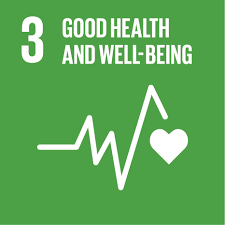 Goal 3: Ensure healthy lives and promote well-being for all at all ages
Goal 3: Ensure healthy lives and promote well-being for all at all ages Goal 4: Ensure inclusive and quality education for all and promote lifelong learning
Goal 4: Ensure inclusive and quality education for all and promote lifelong learning Goal 5: Achieve gender equality and empower all women and girls
Goal 5: Achieve gender equality and empower all women and girls Goal 6: Ensure access to water and sanitation for all
Goal 6: Ensure access to water and sanitation for all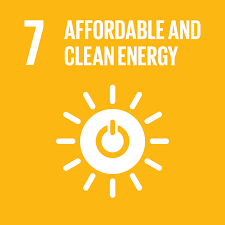 Goal 7: Ensure access to affordable, reliable, sustainable and modern energy for all
Goal 7: Ensure access to affordable, reliable, sustainable and modern energy for all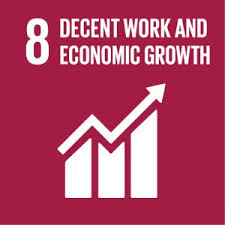 Goal 8: Promote inclusive and sustainable economic growth, employment and decent work for all
Goal 8: Promote inclusive and sustainable economic growth, employment and decent work for all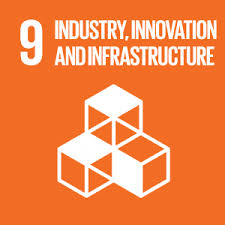 Goal 9: Build resilient infrastructure, promote sustainable industrialization and foster innovation
Goal 9: Build resilient infrastructure, promote sustainable industrialization and foster innovation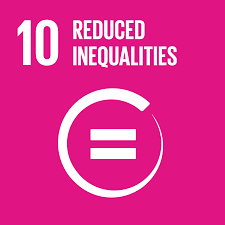 Goal 10: Reduce inequality within and among countries
Goal 10: Reduce inequality within and among countries Goal 11: Make cities and human settlements inclusive, safe, resilient and sustainable
Goal 11: Make cities and human settlements inclusive, safe, resilient and sustainable Goal 12: Ensure sustainable consumption and production pattern
Goal 12: Ensure sustainable consumption and production pattern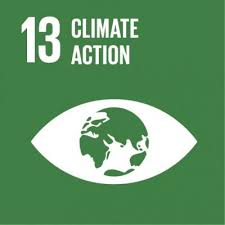 Goal 13: Take urgent action to combat climate change and its impacts
Goal 13: Take urgent action to combat climate change and its impacts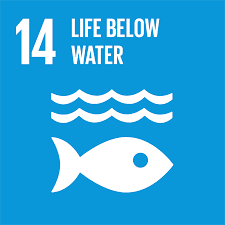 Goal 14: Conserve and sustainably use the oceans, seas and marine resources
Goal 14: Conserve and sustainably use the oceans, seas and marine resources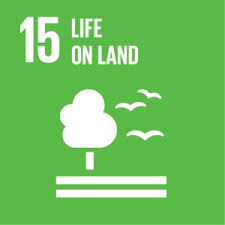 Goal 15: Sustainably manage forests, combat desertification, halt and reverse land degradation, halt biodiversity loss
Goal 15: Sustainably manage forests, combat desertification, halt and reverse land degradation, halt biodiversity loss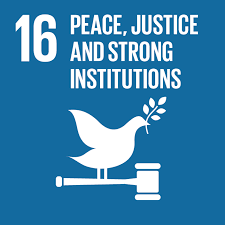 Goal 16: Promote just, peaceful and inclusive societies
Goal 16: Promote just, peaceful and inclusive societies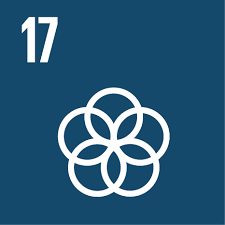 Goal 17: Revitalize the global partnership for sustainable development Finance
Goal 17: Revitalize the global partnership for sustainable development Finance